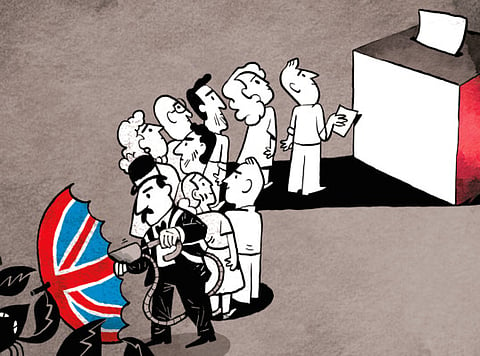Britain heads for much closer polls than expected
Trump’s ill-informed attack on Khan offended many Britons and May’s slow response gave Corbyn a useful opportunity

Britain goes to the polls today after an extraordinary campaign that moved from being a re-affirmation of Prime Minister Theresa May’s Brexit strategy to become what looks like a successful assault on her domestic policies. The massive majority that May hoped for might not materialise. But the horror of more terrorist murders in London meant that the final few days of the campaign were not dominated by the fascinating TV discussions of the previous week, but by the security situation in the country. The vicious attacks on Saturday evening stunned the United Kingdom, and the politicians agreed not to campaign for a day out of respect for the dead.
But that did not last long. On Sunday morning, May delivered a speech that went well beyond the expressions of sympathy and condolences that would have been appropriate and suggested a four-point plan that expanded her electioneering ideas to fight terror. She said that “enough is enough” and called for more to be done to regulate cyberspace to prevent the spread of extremism and terrorist planning, and to hold big internet companies to account. But she also said that there is “far too much tolerance of extremism” in a dig at Labour party leader Jeremy Corbyn’s record of speaking to groups like the Irish Republican Army and Hamas — even though he has regularly said that he abhors violence.
Since she opened the gate to campaigning speeches, Corbyn then gave one of his better attacks on May who had been home secretary for the six years of former prime minister David Cameron’s governments and so is directly responsible for the cut of 20,000 policemen across Britain that many senior police and security officials say has greatly hampered their ability to fight terror. Corbyn did not hesitate to point this out with great clarity, to the fury of the Conservative faithful who berated him for breaking the ban on campaigning. The national election campaign has been enlivened by the running feud between London Mayor Sadiq Khan and United States President Donald Trump. After the 2015 San Bernardino attack in California, which killed 14 and wounded 22, the then Republican primary candidate Trump had called for a “total and complete shutdown of Muslims entering the United States”. Khan at the time said this was wrong and later challenged Trump to an IQ test to illustrate the folly of his positions.
The US president is good at holding a grudge, but this can lead him astray. Last Saturday, in the immediate aftermath of the attack, Khan tweeted: “My message to Londoners and visitors to our great city is to be calm and vigilant today. You will see an increased police presence today, including armed officers and uniformed officers. There is no reason to be alarmed by this.”
‘No reason to be alarmed’
Trump mis-read this and responded: “At least 7 dead and 48 wounded in terror attack and Mayor of London says there is “no reason to be alarmed!” And on Monday morning, Trump compounded his error by tweeting: “Pathetic excuse by London Mayor Sadiq Khan who had to think fast on his ‘no reason to be alarmed’ statement. MSM is working hard to sell it.”
Trump finally recognised what was happening and after ducking questions from journalists on the controversy, he admitted that “I think Sadiq Khan is doing a good job and it’s wrong to say anything else”.
Nonetheless, many in Britain resented that the American president had seen fit to weigh in and slander the mayor of London in one of London and Britain’s times of trial. The majority of campaigning politicians jumped to defend the well-liked Khan, but May delayed till Tuesday to say that Trump was wrong. Her slowness to react to Trump’s ill-informed remarks gave the impression that she was reluctant to criticise him at all, particularly when she also told the Sun that the “relationship with America is our deepest and most important defence and security relationship”.
And this followed her refusal to sign a common European letter of regret that Trump had abandoned the Paris Accord on climate change. May is in danger of appearing as Trump’s poodle, mirroring the dangerous charge that was successfully laid against former prime minister Tony Blair with his slavish following of George W. Bush into the war in Iraq. This might be very dangerous for May, given Trump’s volatility.
All this has helped Corbyn cut May’s lead from around 20 per cent in the polls to anything between 1 to 10 per cent depending which poll you like. It has made the result surprisingly unpredictable, and although May seems likely to be the leader, the size of her lead will be vital to what authority she can muster in the next government.
From the current narrow Conservative majority of 12, if she gets a majority of anything under 30, she will be deemed a failure. Such a number will lay her open to blackmail from 15 determined hard-core Brexiteers if she comes back with a final deal from Brussels that has made compromises. If she gets anything above 70, she will be unassailable, and continue to run the country with her narrow group of advisers while safely ignoring her ministers.


